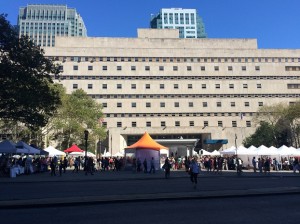
The Brooklyn Book Festival is the largest free literary festival in New York. It has over 50 Bookend events flanking either end of the weekend, and tens of thousands of book lovers come and listen to the panels, browse the sprawling publishers market, and eat overpriced Thai noodles and empanadas. I’ve been going for at least five years, from before I moved to New York, and I think it’s great. And depending on who you talk to, you’ll get a completely different round up than the one I’m going to give below, because the festival is SO diverse and huge.
On Wednesday, September 16, 2015, I co-organized a BKBF Bookend event, Unslain Words: Solidarity for Bangladeshi Bloggers, co-sponsored by PEN American Center and Roulette. The event went really beautifully, and I was really proud to be part of a Bangladeshi effort to raise awareness and solidarity and some funds for our brave and beleaguered bloggers, and do it with creativity, music, and writing. We now have a Facebook group set up to house photos, links, and ongoing information and texts, so please check that out.
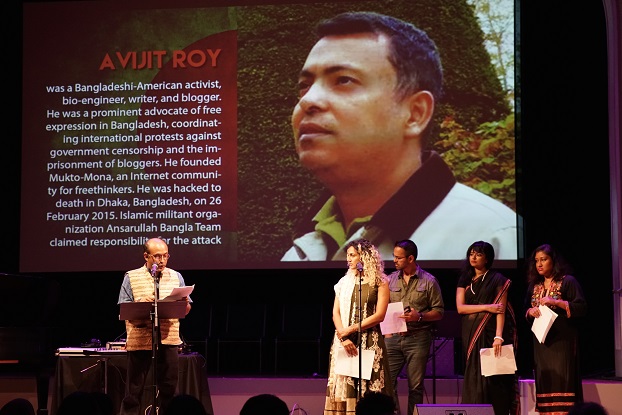
On Friday, September 18, 2015, I attended another bookend event at the lovely little independent bookshop, Unnameable Books, which hosted a reading of Kaya Press and Kundiman writers (who hail from the Asian diaspora). I especially enjoyed Yesenia Montilla’s reading and managed to buy an advanced copy of her debut collection, The Pink Box, at Kundiman’s booth on Sunday. Yesenia — as a fellow pelo malo girl — I too enjoy the frizzy halo around my face but was made sorry for it my whole childhood.
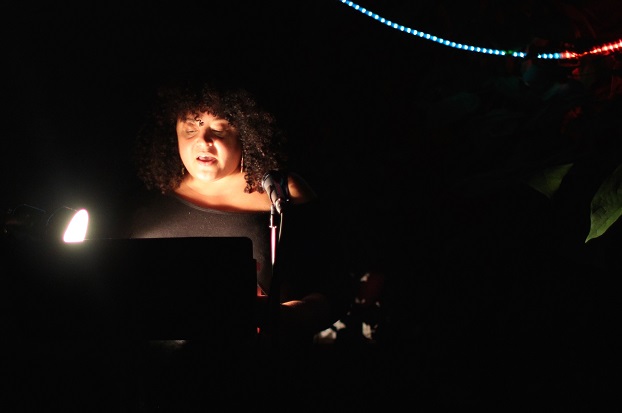
Speaking of Kaya Press, at their stall at the book festival, editor Neelanjana Banerjee introduced me to writer/performer Sam Chanse, whose published play, Lydia’s Funeral Video, is a remarkable attempt to fuse performance, art, and literature (there’s even a flip-book feature in the book). I LOVE it and Kaya Press for enabling these multi-genre efforts.
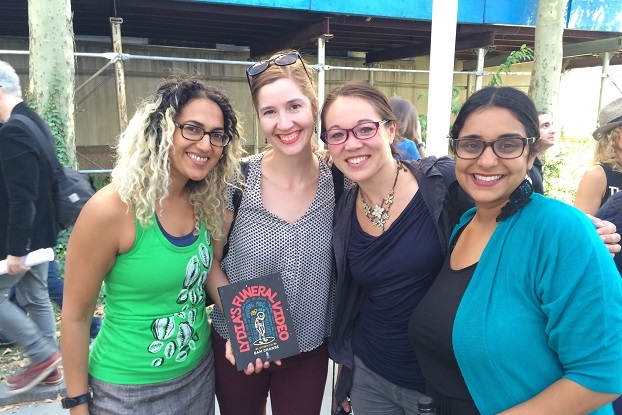
On Saturday, as a Bookend event organizer, I got to attend the opening gala thrown by the BKBF committee. I was a bit disappointed that there was so much/long of a structured program and thus less time to meet and mingle (and BKBF — what’s with closing the bar and not serving any of the snacks on display until after the speeches? Boo).
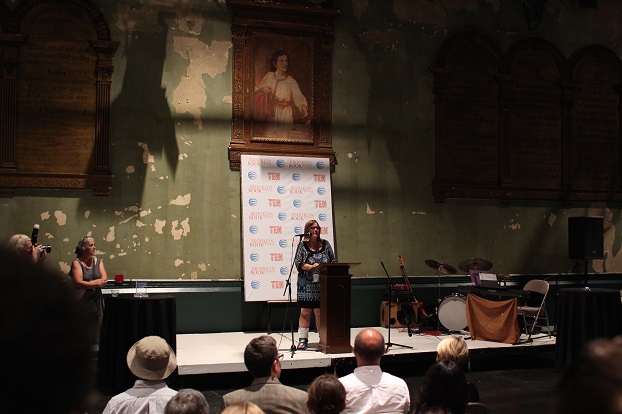
I did get to meet Chris Heiser and Olivia Taylor Smith at the gala, the publishers of a new LA based press, Unnamed Press, and here they are pictured proudly at their stall at the festival. Check them out — they publish cool and quirky titles, including Deji Olukotun’s wacky scifi novel Nigerians in Space, and my fellow Bangladeshi writers, Kazi Anis Ahmed and Saad Z. Hossain.
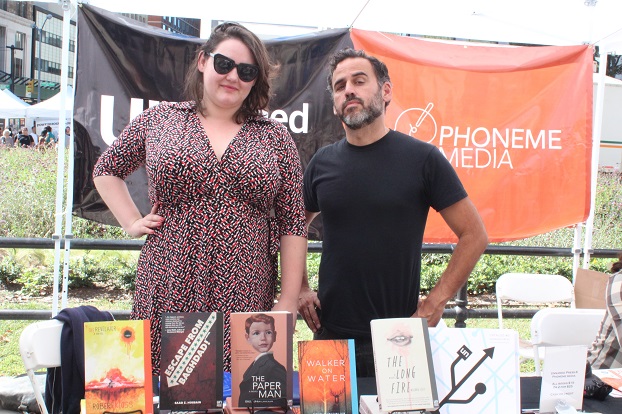
This year’s festival was on Sunday, September 20, 2015 and had just about perfect weather. However, because of construction in the area, there was limited outdoor space for the various stages and publisher booths. This meant more crowds everywhere, and I know of a few panels that had to turn away fans because of overcrowding — like the “Darkness and Light” panel I tried to make it to featuring International Man Booker Prize winner László Krasznahorkai (thank god for cut and paste). Or maybe this always happens and I’ve just gotten lucky the last few years.
BUT this meant that I ended up at a fantastic panel called “Where in the World” about “geography, migration, dislocation, and dynamic landscapes.” If you know me, then you know I am OBSESSED with place, so this is in my wheelhouse. This panel featured T. Geronimo Johnson, Angela Flournoy, and Cecily Wong, three writers I had never heard of, but who I want to read immediately now that I’ve heard them read from their books and talk about their process.
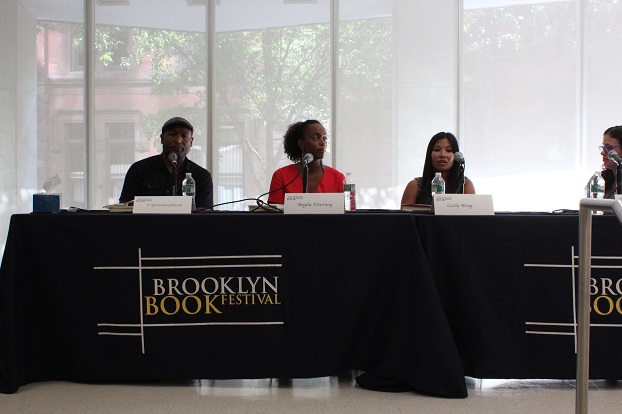
Johnson’s book (Welcome to Braggsville) is set in “Bezerkley,” and since I lived in the Bay Area for four years (two of those years in the drug addled mystic sun drenched town of Berkeley), I was immediately drawn to his vibrant and clear headed writing about that place. Fournoy’s book (The Turner House) is set in Detroit, both present day and the 1940s, and the characters from the passage she read were captivating and deftly described. Plus I am drawn to run down gritty urban spaces with significant POC populations (this is probably because I’m a child of Nigeria and Bangladesh, and why I adored my 10 years in Philly). My favourite panelist was Wong, whose book (Diamond Head) follows three generations of a Chinese Hawaiian family. It’s probably because the Asian connection resonates with me, and plus I much admire that she tackled multi-generational historical fiction in her debut novel, and wrote about a place (China) where she’s never been. Here’s to brave and inventive writers.
Speaking of research, which both Wong and Fournoy spoke about doing intensively for their partly historical books, the funniest moment of the panel came when Johnson countered that he tried to do as little research as possible when writing. “Research is like a well,” he said, “and you have no idea if someone will be able to come pull you out and save you.” As someone who has had to learn to how to research for writing books (it didn’t come naturally to me!), I was relieved to find a writer who had such a refreshingly different attitude. Not that Johnson doesn’t care for factual or other truths, but he’s more interested in the moment, in mindfulness.
The other panel I attended was “Revolution and Repression” about “sexuality, gender, and politics.” I was eager to finally see Melissa Gira Grant in person. She’s a friend of a dear friend, a former sex worker, and a journalist who writes passionately and articulately about sex, politics, and technology. I’ve followed her Twitter feed for years now and it astonishes me how much I learn and have yet to learn from her. During the panel, Grant talked about the two feminisms that battle in her mind, dystopian feminism (which she describes as the flawed movements of today) and utopian feminism (the kind she wishes it were). I love that she immediately brought up the dominance of white feminism, and also wondered out loud whether any of the feminisms were going to be helpful in the fight for transgender rights and dignity. “I’m straddling gen X and Y, but I’m more pessimist than millennial,” she said, “I mean, I’m hopeful, but I have low expectations.” Ha. Her fellow panelists were also articulate and interesting (trans memoirist Thomas Page McBee and the fire cracker Egyptian writer and personality Mona Eltahawy).
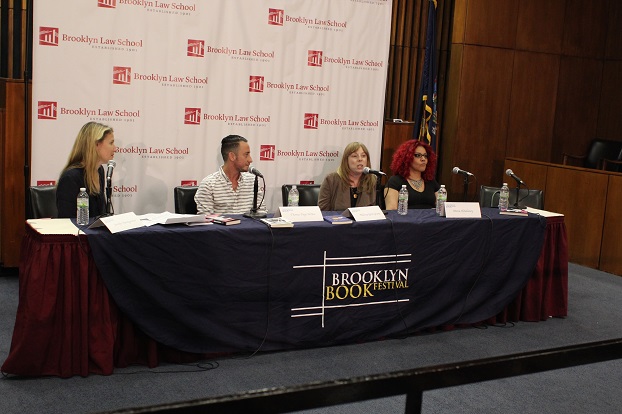
I wish I had been able to go to more panels, but it turns out my attention span doesn’t do well with back to back panels. I had to jump out of a panel featuring comic creators, because of a sneezing attack and brain overload (although no fear, Julian Voloj, Lisa Wilde, and A.K. Summers — I checked out your fabulous graphic offerings at the bookstall).
And I also wanted to attend the marketing panel (cleverly titled “How to Help Readers Discover Your Book Today” har har) but I was a bit demoralized at the prospect of having to know and do so much to sell one’s book. Sigh. I should have gone, but instead I ate an empanada and stared longingly at Graywolf’s offerings (they are my dream publisher).
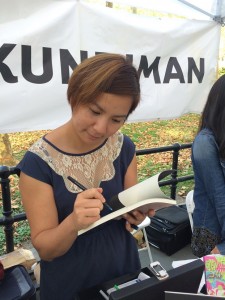
There are still bookend events to come, and even though I’m not going to any more official BKBF events, I still have two awesome literary events to attend in the next couple of days (I love New York). First up is AAWW’s Margins Fellows reading, with the vivacious trio Wo Chan, Muna Gurung, and Rowan Hisayo Buchanan, on Tuesday September 22, 2015, at the AAWW offices. And second is Nigerian writer Chinelo Okparanta’s launch of her second book (Nel, you are ridiculously prolific) at Housing Works Bookstore Cafe on Wednesday, September 23, 2015.
I’m off to read some new poetry purchases in bed, including Kundiman director Cathy Linh Che’s collection, Split. One last shoutout: to Kaya Press’ inaugural #LITinColor Treasure Hunt where participants were encouraged to find authors of color throughout the festival, and post photos, autographs, quotes, and other literary ephemera on social media. I had fun looking, snapping, and posting, and I hope the tag keeps rolling.
* * *
Abeer Hoque is a Nigerian born Bangladeshi American writer and photographer. The Lovers and the Leavers (HarperCollins India, 2015) is her book of interleaved stories, poems, and photographs. See more at olivewitch.com. Photos provided by Abeer Hoque except where noted.












